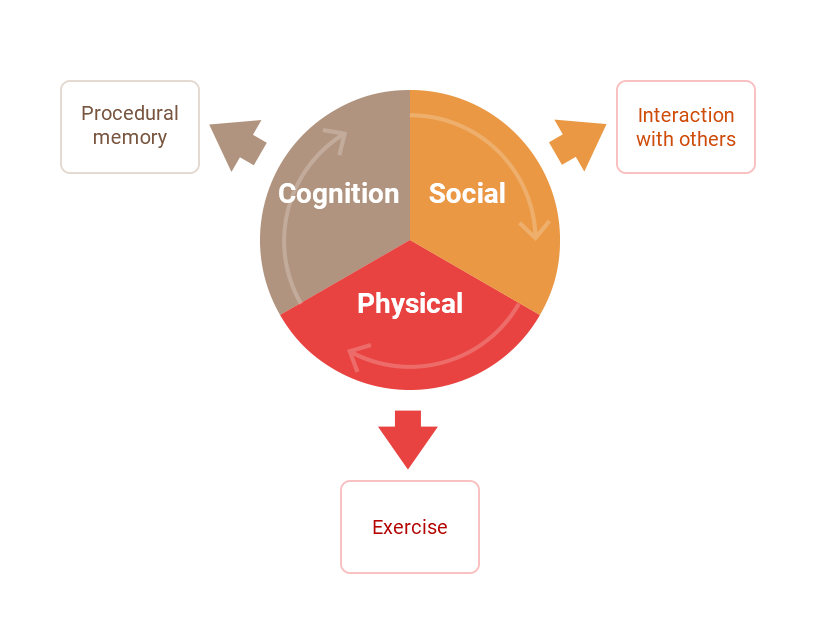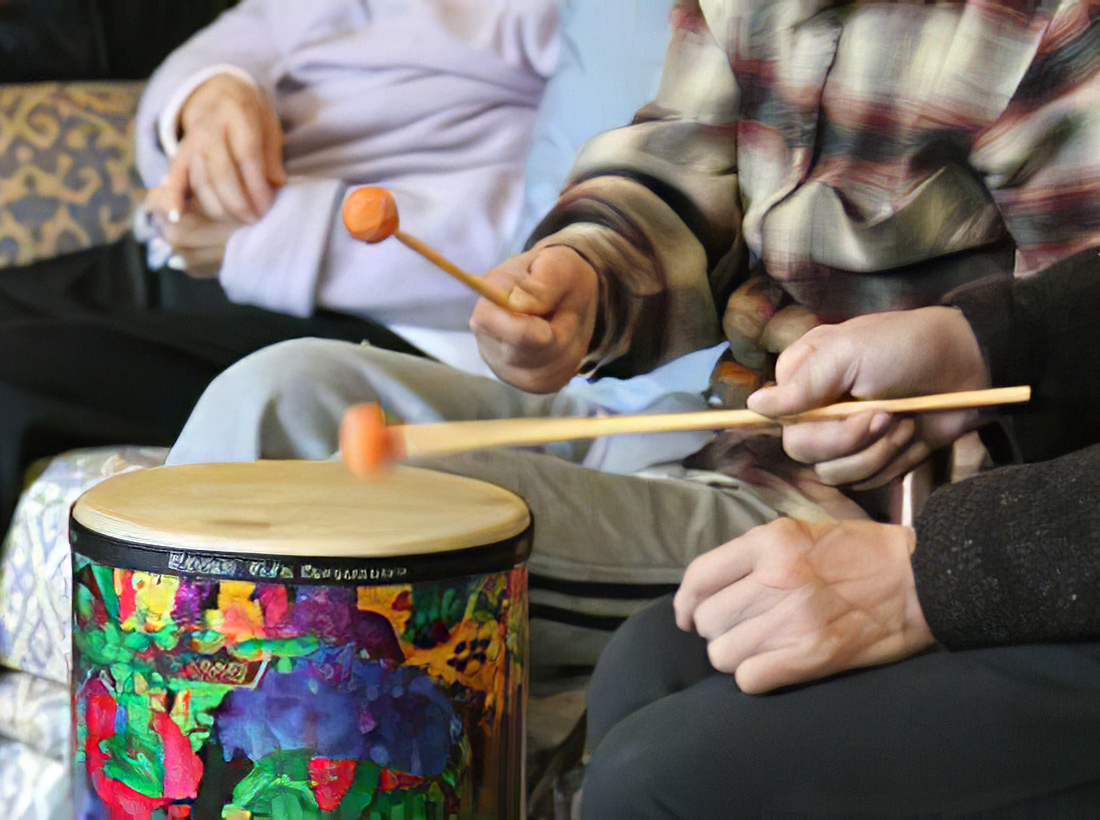Key points
- Proper activities can stimulate the use of various cognitive functions and increase self-esteem.
- Activities should be interesting to the person and appropriate to his or her level of cognitive functioning.
Cognitive stimulation, physical exercise, and social lives are essential for people with dementia to stay healthy and active. They will bring enjoyment, pleasure, connections, belonging, autonomy, and identity to the person. They can prevent or slow down the progress of cognitive decline. Conversely, the decline of cognitive functions may accelerate if we do not encourage people with dementia to utilize their abilities.

People with dementia will be more interested in activities that can utilize their strengths. To make it simple, you can look for strengths in the following categories:
People who are strong in language are often more sensitive to words, speech and meanings. Most of them are interested in:
- Crossword puzzles
- Listening to and joining conversations
- Reading the words on posters and banners
- Reading newspapers and magazines
Recommended activities:
- Naming things from picture cards
- Crossword puzzles
- Calligraphy
- Speaking about the origins of proverbs
- Composing new lyrics for old songs
People who are strong in physical activities like to move their body. They prefer experiencing through their body over listening to information. Most of them are interested in:
- Walking, jogging, and cycling
- Ball games
- Handicrafts, such as sewing, knitting, and carpentry
- Dancing
Recommended activities:
- Old games, such as quoits, jacks, marbles, and hummers
- Simple knitting, like making rattan works
- Simple exercise, such as tai chi and stretching
- Simple crafts, such as paper folding, cotton-ball crafts, and playdough
People who are strong in music and rhythm are often more sensitive to sounds. Most of them are interested in:
- Singing
- Playing musical instruments
- Poetry
- Listening to music and opera
Recommended activities:
- Singing
- Reading poems
- Clapping beats (e.g. "You are my sun[clap]shine[clap], my only sun[clap]shine[clap]/ You make me hap[clap]py[clap] when skies are grey[clap]")
- Matching beats with gestures (e.g. "You are my sunshine [a gesture], my only sunshine [another gesture]/ You make me happy [another gesture] when skies are grey [another gesture]")
People who are strong in logic and calculations are often better at strategy games that require calculations. Most of them are interested in:
- Counting and calculations
- Card games
- Board and tile games
- Arcade games
- Photo hunts
Recommended activities:
- Photo hunts
- Simple calculations, like games that involve purchasing
- Simple sorting, like organizing poker chips
People who are strong in communication are often more sociable and like to stay with other people or animals. They are more sensitive to the needs of others. Most of them are interested in:
- Joining sharing groups
- Chatting
- Helping others
- Spending time with children and animals
Recommended activities:
- Creating stories
- Reminiscing
- Simple cooking
- Taking care of dolls or cuddly toys
- Sharing and discussions about news or soap operas
People who are good at self-reflection often need to stay alone. They usually have unique views on the world. Most of them are interested in:
- Spending time alone
- Doing their own things
- Observing other people
- Dressing themselves up
Recommended activities:
- Jenga
- Sorting beans
- Decorating clothing and daily goods
- Dressing up and applying makeup
- Simple crafts, such as drawing, stringing beads, and glass art
People who love nature are more responsive to the sounds of nature, beautiful photos, and plants and animals. Most of them are interested in:
- Animals and birds
- Spending time in natural settings
- Beautiful paintings and photos of nature
- Flower arrangements
- Pottery
Recommended activities:
- Going to the park
- Planting
- Flower arrangement
- Drawing
- Photography
- Paper clay
- Decoupage art
Activities are meaningful to people with dementia when they are at an appropriate level for them. Meaningful activities will give enough satisfaction to provide motivation to continue. You may design activities with reference to the Pool Activity Level and further adjust the level of difficulties of the activity according to the ability of the person.
| Planned activity level |
|
Can work toward goal-directed activities and enjoy reaching a tangible outcome.
Recommended activities
- Traditional board games
- Simple cooking
- Group discussions and quizzes
|
| Exploratory activity level |
|
Can carry out familiar activities in familiar surroundings. Enjoys the process of doing the activity more than the final outcome.
Recommended activities
- Simple crafts, such as knitting, painting, and pottery
- Reminiscence
- Dance and movement with music
|
| Sensory activity level |
|
Primarily concerned with experiencing sensations and moving their body in response. Enjoys repetitive simple, small steps in activities.
Recommended activities
- Simple ball games
- Planting
- Simple housework, such as folding, dusting, and sweeping
|
| Reflex activity level |
|
Often unaware of the surrounding environment and their own body. Able to provide reflex response to direct sensory stimulation, such as blinking and turning to the direction of sounds.
Recommended activities
- Listening to music
- Massage and body touch
- Multisensory stimulation, such as tasting and touching different things
|
| |
Planned activity level |
Exploratory activity level |
Sensory activity level |
Reflex activity level |
 |
- Naming things
- Crossword puzzles
- Speaking about the origins of proverbs
- Composing new lyrics
|
|
|
|
 |
|
- Simple knitting
- Simple crafts
- Simple exercise
|
- Simple ball games
- Simple housework
|
|
 |
|
- Clapping beats
- Dance and movement with music
|
|
|
 |
- Photo hunts
- Simple calculations
- Traditional board games
|
|
|
|
 |
- Creating stories
- Simple cooking
- Group discussions and quizzes
|
|
- Taking care of dolls or cuddly toys
|
|
 |
- Jenga
- Dressing up and applying makeup
|
- Sorting beans
- Decorating clothing and daily commodities
- Simple crafts
|
|
|
 |
- Flower arrangement
- Photography
|
- Drawing
- Paper clay
- Decoupage art
|
- Going to the park
- Planting
|
|
Summary
- People with dementia often lose interest in many things. Caregivers can arrange activities that match a person's living habits, past experiences, and level of ability to make the pursuits more interesting and attractive.
- The level of ability of the person will change over time. Caregivers should carry out assessments every six months so that the activities will conform to any changes in the person.

























